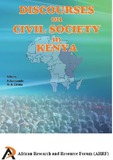| dc.contributor.author | Wanyande, Peter | |
| dc.date.accessioned | 2013-06-24T12:21:02Z | |
| dc.date.available | 2013-06-24T12:21:02Z | |
| dc.date.issued | 2009 | |
| dc.identifier.citation | Discourses on Civil Society in Kenya | en |
| dc.identifier.isbn | : 9966 7062 7 5 | |
| dc.identifier.uri | http://ke.boell.org/downloads/Civil_Society_in_Kenya.pdf#page=19 | |
| dc.identifier.uri | http://hdl.handle.net/11295/38988 | |
| dc.description.abstract | This paper attempts to shed insights into the contribution of civil society to the politics
of transition in Kenya. The paper highlights some of the actual contributions made
by civil society to the politics of transition as well as their potential to contribute to
transition politics. This includes a highlight of both the direct and indirect contribution
of this sector to the politics of transition. Also taking pride of place in the discussion
are the challenges facing civil society. From the discussion on the challenges the way
forward for civil society in Kenya should emerge. Since attempts at political transition
have been a feature of Kenya’s political landscape since the colonial period, the
discussion takes an historical approach. This is done in order to place the issues in
their right historical perspective.
The paper presents four arguments. First is that any discussion of the role of civil
society in the politics of transition must take cognizance of the complexity of transition
politics and the fact that the undertaking involves competition first between the
conservative forces bent on maintaining the status quo and the progressive groups
that wish to make fundamental changes to the existing system on the one hand and
on the other, competition within each of these forces. This point is well articulated
by Adam Przeworki (1991). The politics of transition thus involves a multiplicity of
actors with civil society being only one of them. Consequently it becomes difficult
to measure the contribution of any single actor. It is because of this that one has to
be careful in crediting or admonishing any of these actors, CSO undivided, with the
success or failure of a transition project. The second argument is that not all civil
society organizations have made a positive contribution to attempts at political 9
transition. A number of them have in fact worked closely with conservative forces in
government to frustrate the efforts to effect political transition. This is not surprising in
view of the heterogeneity of civil society and the fact that it is made up of groups with
diverse interests in a political system both existing and anticipated. The final argument
is that the effectiveness of civil society in Kenya has oscillated between being active
and being dormant depending on the type of regime in power and the quality of civil
society leadership. | en |
| dc.language.iso | en | en |
| dc.publisher | African Research and Resource Forum(ARRF | en |
| dc.title | Civil Society And Transition Politics In Kenya: Historical And Contemporary Perspectives | en |
| dc.type | Article | en |
| local.publisher | Department of Goverment, University of Nairobi | en |

